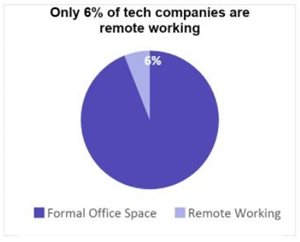How rapid growth in the tech sector is setting the tone for Africa's property market

Tech as a key driver of formal office demand
While the office market has continued to evolve over the past year due to the pandemic, technology has remained the core driver for hybrid and remote working policies. Tech companies themselves have also been at the forefront of driving flexible working amongst their employees. However, occupying a formal working space remains integral to most of these companies.
Estate Intel reviewed the top 50 tech (startups and multinationals) companies in each city across Lagos, Nairobi and Johannesburg and found out that 94% of these companies occupy a formal working place. 85% of these occupied leasable space, with 3% occupying co-working spaces and 4% occupying owner-occupied offices. Only 6% were fully remote companies, echoing the rhetoric that indeed the tech sector will continue to drive office demand as activity in the sector intensifies.

War for talent driving demand for housing in Africa
On the other hand, with the technology sector set to be a major employment driver across key African cities, an emerging component of real estate demand is also likely to be residential housing across both the affordable and luxury housing sub-sectors. In Lagos, for example, the existing housing supply gap, coupled with the tech sector, is spurring demand for housing from young professionals. As such, we are seeing key emerging hotspots, such as Yaba, tracking the overall residential market at an annual rental yield of 5%. This trend is only set to intensify as Lagos, Nairobi and Johannesburg emerge as the tech hubs of Africa.
Repurposing

Another key emerging trend has been the theme of repurposing real estate. While physical offices continue to be a core element of corporate tech premises, most of the tech companies are more focused on flexibility and affordability. As such, anecdotal evidence in cities such as Lagos and Nairobi points to tech startups increasingly gravitating towards repurposing residential villas and houses into office spaces not only because it makes financial sense, but also due to the flexibility in strategic locations.
Say Tilda Mwai, research and insights lead at Estate Intel: “Overall, the tech sector in Africa presents real opportunities for investors and developers in the mainstream real estate and in the alternative sectors such as data centres. While there is no ‘one-size-fits-all’ approach, we expect to see more opportunities on the occupier/tenant-end of the market to meet a new, evolving demand in the market.”





